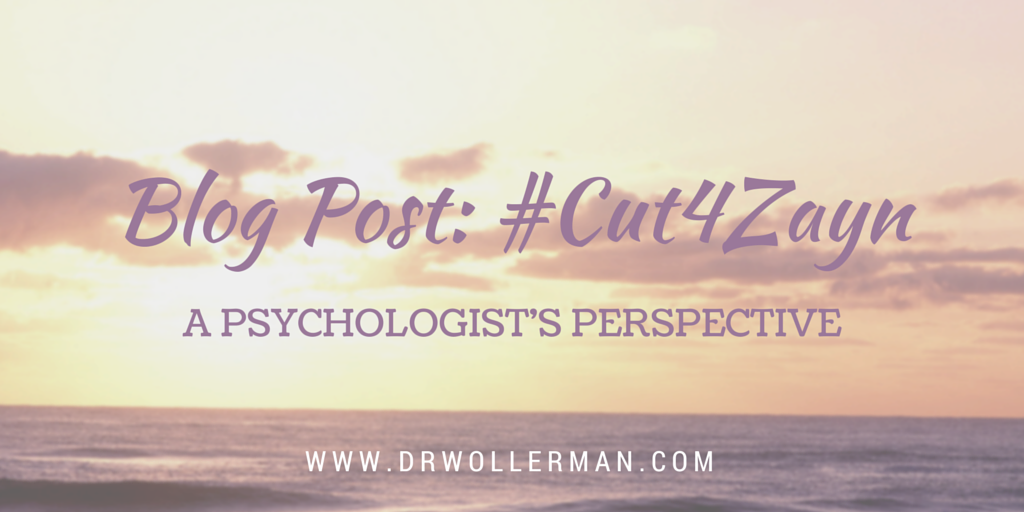
The more that I reflected on this particular scenario and the overall topic of self-harm, the more I felt strongly that instead of posting about more typical topics around cutting (how to stop people from doing it, what to do if your teen is cutting, etc) I wanted to have a discussion of WHY this might be happening so frequently and in such a dramatic, public way. Please keep in mind that this is mainly my opinion, which is based on what I see in my office and in our culture but not on specific, measured, scientific facts necessarily.
This topic also ties in with some of my fundamental beliefs about why people are feeling so stressed, anxious, unhappy, and disconnected because I think many people are cutting for exactly those reasons. While I might come off as entirely elderly during this post, I’m kind of okay with that! As I have gotten older, particularly given the work I do, I have gained such an appreciation for simpler times (which I would categorize my childhood in as I grew up prior to the internet in the 80s).
Here we go! The following is a summary about some factors I see as influencing Americans mental health and leading us to feel generally unhappy, disconnected, anxious, and stressed and which also could lead people into self-harming.
The Happiness Obsession: This is my way of saying that we are all SO focused on being happy all the time that I believe people are losing their ability to understand, accept, and tolerate discomfort and the less pleasant emotions. I covered this topic in another blog post as well (feel free to read that here) but in essence, I think that particularly younger individuals have an expectation of being happy and excited all the time. This is so entirely unrealistic that it is the definition of an unreachable goal but so many people may not realize this, which creates feelings of isolation and anger that THEY are not happy, since everyone else must be. After all, that’s what TV shows (well, happiness or complete and total DRAMA but that’s another topic). This also reduces our capacity to regulate ourselves through less pleasant emotions and situations, which can lead to cutting behavior.
General disconnection through mass media overload: I should preface this section by saying that I generally have a love-hate relationship with the media. While I love some great/terrible reality TV, I am also highly concerned about the impact TV, movies, the Internet, social media have on us as human beings. I believe that our expectations are so driven by what we see on the Internet that they are entirely skewed. I even find myself falling into this trap and thinking, well they have time for that (on my favorite show), why don’t I? While I mediate this thought by reminding myself that I live in reality and not a made-up world on TV, I can imagine how hard that is to do for someone who is younger, less mature, and likely to be less educated about how the media impacts our perceptions.
There is also the factor of how much time we spend connecting with other people in inauthentic ways, such as through social media or even texting. I find it concerning that so many of the teens I work with do not communicate with their friends verbally apart from occasionally at school. Most things are communicated through some sort of electronic source, which I believe reduces our ability to connect in an authentic way where we feel connected and heard by the other person. Plus, anything in writing could be misinterpreted, saved, and even used against someone and as such, many people are less likely to be truly vulnerable in writing. I believe that connection and vulnerability are so important in developing emotional resilience as well as shame resilience and without face-to-face communication, we are all lacking these skills to some extent.
Expectation of Perfection: Failure has somehow become such a dirty word in our culture. The sad thing to me is that so much of our learning comes from our failures and being open enough to try something different but we are all so consumed with being perfect and doing things “right” that we are often afraid to try something new. In many ways I do think our culture has forgotten that it is hard work, failure, and perseverance that drives success, not doing everything right all the time. I see parents often trying to help their children avoid any sense of failure, which unfortunately only leads to them never developing the resiliency to deal with failure and recover from it. This is particularly concerning to me because I do think this is a huge risk factor for self-injury as well. A shame spiral so quickly develops when we feel ashamed for our mistakes and can spin all the way down to being completely worthless, ashamed, and terrible which could certainly lead someone to feel like harming themselves in one way or another.
All of these factors lead to reduced emotional resiliency and regulation skills, which are key factors in developing healthy relationships and coping skills. My next blog will discuss ways to help facilitate resiliency in kids and teens. Stay tuned!
I hope you enjoyed reading this post! Let me know what you think in the comments section or feel free to send me an email.
 RSS Feed
RSS Feed